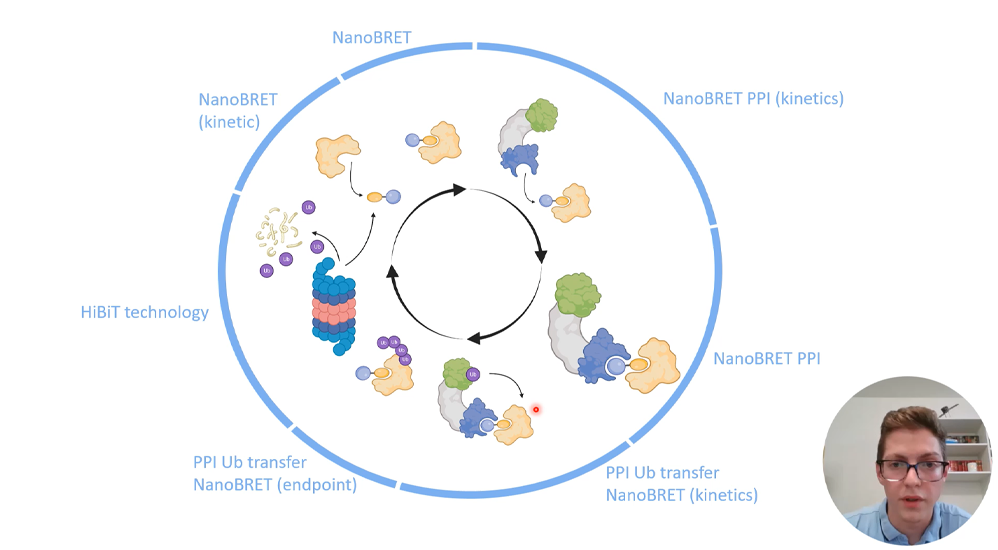Martin Schwalm
Pharmaceutical Chemistry,
Goethe University Frankfurt
Degrader development/drug screening
Help me to win the Young Researcher
Award 2023 from Promega.
Why should you vote for me!
The NanoLuc/HaloTag system is a great toolbox and I have used it for several peer-reviewed drug development projects, developed novel assays and repurposed existing systems for new applications, particularly in the field of targeted protein degradation. These systems now enable efficient drug screening and validation and have already been adapted by academia and the pharmaceutical industry for independent projects. It would be an honour to receive the Young Investigator Award for my work in the field of drug development and cancer therapy.
Abstract
Targeted protein degradation (TPD) is an emerging technology to tackle diseases and related small molecules are crowding into the clinic. The most prominent approach for TPD are the bifunctional PROteolysis TArgeting Chimeras (PROTACs). In this technology, the compounds hijack a multistep degradation cascade which ultimately leads to the proteasomal degradation of the POI. For this, PROTACs contain a POI ligand, and a so called “handle” which recruits an E3 ubiquitin ligase, while both are connected through a linker. Due to the high complexity of the underlying mechanism, validation of these small molecules harbours diverse challenges and requires investigation of every single PROTAC-induced event to fully understand the behaviour and success of chemical series of degrader molecules.

For this, the key steps:
- I) Cell membrane penetration,
- II) Target engagement (binary complex),
- III) ternary complex,
- IV) ubiquitination and finally
- V) POI degradation will be monitored.
Full understanding of these different events will allow faster PROTAC optimization, better validation and easier adaption of novel E3 ligases to be recruited for TPD. Ultimately, the goal is the discovery of novel E3 ligases with disease-related expression patterns to obtain disease or cancer selective POI degradation and therefore avoiding drug-induced side effects.
Describe the activity of your laboratory in a few lines:
Our laboratory, led by Stefan Knapp as PI, focuses on the development of selective kinase inhibitors and epigenetic modulators. In recent years, we have expanded our activities in the field of degrader development. Overall, we provide well-characterised chemical tools for chemical biology, from the famous BET inhibitor JQ1 to assay systems for in-depth compound characterisation, mainly in the field of cancer research and therapy.

If you were a famous scientist, who would you be?
Edwin Hubble, exploring the depths of the universe and having a space telescope with your name on it seems pretty cool.
Tell us something about your scientific background :
I studied biosciences in Frankfurt and did my Master's degree in molecular biotechnology. For my master's thesis, I joined Tobias Erb's group at the Max Planck Institute in Marburg to work in the field of synthetic biology and metabolic engineering. For my PhD, I switched to drug development and joined Stefan Knapp's group to work on small molecule protein degraders, an emerging technology that is currently entering the clinic. As many mechanisms and aspects are still unknown, my current focus is on unravelling the parameters of this technology, where I mainly build my assays from the NanoLuc/HaloTag toolbox. Recently, I have assembled a pipeline to unravel the mechanism of action of small molecule degraders targeting WDR5, a promising target for lymphoma treatment.
Can you describe yourself in 3 adjectives?
curious, inventive, ambitious
What are your other interests outside of science?
Outside the lab, I enjoy spending time with friends, playing the piano and restoring classic cars to get them back on the road.